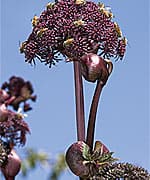Life Extension Magazine®
| Whether chronic or acute, pain is debilitating and severely limits one’s ability to live life freely.
Safe pain management is one of the great challenges faced by today’s physicians. Unfortunately, drugs that relieve pain come with a range of serious side effects such as kidney, liver, and stomach damage. For the person in pain, relief is not without its risks. Fortunately, scientists have discovered a botanical extract that offers powerful relief of pain. Derived from Korean Angelica, this herbal extract works to relieve the discomfort associated with conditions such as arthritis and injury—without the side effects of common analgesics. Additionally, this extract shows efficacy in inhibiting a critical cancer cell growth factor, and may even help protect the nervous system against age-related cognitive decline. Both patients and doctors are in a constant search for a new, safe form of pain management. With Vioxx® off the market, and the new drug Arcoxia® recently sidelined by an FDA “non-approvable letter”, a huge void remains for those seeking relief from chronic and acute pain. The search led scientists to Korean Angelica, an herbal extract that acts safely on the central nervous system to fight pain—without the side effects associated with non-steroidal anti-inflammatory drugs (NSAIDs) such as ibuprofen. Korean Angelica goes to work easing aches and pains, which can enable many people to resume living life to the fullest. A Better Pain RelieverIdeally, a pain-relief product would display effective broad-spectrum action against many types of pain, with no toxic or adverse effects. New research is surfacing around a specialized type of Angelica known as Angelica gigas Nakai. Unlike other forms of Angelica, Angelica gigas Nakai has been shown to contain high levels of unique phytochemicals known as decursin and decursinol. Selectively found in areas of Korea, Korean Angelica is the fastest growing product currently sold in that country due to its outstanding ability to relieve painful conditions such as arthritis. These remarkable properties of Korean Angelica have been captured in a specialized extract called Decursinol-50™. A Different Approach to Pain ReliefBased on its long use in traditional herbal medicine, Korean researchers set out to develop an effective natural pain reliever containing active ingredients derived from the herb Korean Angelica. Research has shown that this powerful analgesic agent goes to work almost immediately in the body. Unlike many prescription and over-the-counter pain relievers that inhibit the COX (cyclooxygenase) enzymes, Korean Angelica fights pain through its effects on the central nervous system. With this mechanism of action, Korean Angelica helps blunt or eliminate numerous types of pain.1,2 Studies suggest that the herbal extract may work by mediating the action of receptors for serotonin and noradrenalin, two nervous system messengers. Scientists recently reported laboratory evidence showing that an active constituent derived from Korean Angelica inhibits activation of nuclear factor-kappa B (NF-kB), a DNA transcription factor that is involved in many inflammatory and disease states, including cancer.3 This ability to block NF-kB is highly significant. Currently, pharmaceutical companies are aggressively investigating NF-kB and the signaling pathways that regulate its activity. This is because NF-kB regulates the transcription of numerous genes, particularly those involved in immune and inflammatory responses, as well as those that confer resistance to programmed cell death.4 Promising Animal Studies
Korean Angelica has displayed impressive pain-modulating properties in animal studies. When an extract of Korean Angelica was orally administered to mice prior to several types of pain-provoking stimuli, the animals displayed fewer signs of distress. The effects of Korean Angelica were dose-dependent, with higher doses producing greater relief. While Korean Angelica helped decrease the animal’s distressed responses to numerous types of pain, the study findings suggested that its effects may be particularly effective against inflammatory pain.1 Decursinol, a phytochemical derived from Korean Angelica, was similarly effective in protecting animals against the distress caused by chemical irritants. In an animal study, decursinol displayed multi-faceted effects against pain, promoting a more comfortable response to several types of discomfort.2 Impressive Clinical Trial Displays Efficacy of Korean AngelicaScientists conducted a clinical trial at the Mapo Pain Clinic in South Korea to evaluate the effectiveness and safety of a Korean Angelica extract known as Decursinol-50™. The study examined a group of individuals with chronic pain due to degenerative arthritis or other disorders that were unresponsive to treatments such as oral analgesics or intra-articular (within the joint) injections. Forty participants received 250 mg of Decursinol-50™ twice daily for two weeks in conjunction with a physical therapy regimen, while a control group of 40 people received physical therapy only to manage their pain. Blood tests on both groups were conducted, and the degree of pain was measured using a visual analog scale. After two weeks, pain scores were significantly reduced in 68% of the participants treated with Decursinol-50™. Pain scores in the control group (physical therapy alone) improved in only 15% of those treated. The treatment was well tolerated with no adverse effects noted, indicating the safety of the extract. No significant changes in blood pressure, respiration rate, or electrocardiogram results were observed following treatment with Decursinol-50™.5 Based on these promising experimental findings on Korean Angelica, scientists believe that the extract may find applications in managing a wide range of painful afflictions. These include: the chronic joint pain of osteoarthritis and rheumatoid arthritis, the discomfort of overuse injuries, as well as acute pain due to injury.
| ||||
Other Benefits of Korean AngelicaCancer ProtectionLike many other natural therapies, Korean Angelica may offer numerous benefits for human health. Cancer researchers are turning their attention to this promising botanical remedy, as studies show that Korean Angelica may help inhibit tumor growth and metastasis while increasing the rates of programmed cell death in leukemia, melanoma, and prostate cancers.6-11 While much remains to be learned about Korean Angelica’s benefits for cancer protection, it seems likely that the herbal extract’s effects are linked with its ability to modulate inflammation—a contributor to cancer and many other chronic diseases. Averting Alzheimer’s DiseaseThe benefits of Korean Angelica may extend beyond fighting pain and guarding against cancer to protecting the brain and nervous system against age-associated disease and decline. Studies suggest that compounds derived from Korean Angelica may protect the delicate brain from a variety of damaging factors, and may even mitigate susceptibility to Alzheimer’s disease.12,13 Evidence suggests that Korean Angelica prevents the breakdown of acetylcholine, an essential neurotransmitter involved in healthy memory function.14,15 This mechanism is shared by several pharmaceuticals such as Aricept® that are commonly used in the treatment of Alzheimer’s disease. Additionally, Korean Angelica helps protect against memory impairment induced by amyloid-beta, damaging plaques seen in the brains of patients with Alzheimer’s disease.12-16 These exciting studies strongly suggest that Korean Angelica may one day find applications in the prevention and management of Alzheimer’s disease. Further research may illuminate the effects of Korean Angelica in preserving healthy cognitive function with aging.
Dosing and SafetyThe recommended dose of the specialized Korean Angelica formulation called Decursinol-50™ is 250 mg, once or twice daily as needed. Some individuals find it helpful to begin with the larger dose of 500 mg daily to aggressively manage pain, and are able to later reduce their daily dose to 250 mg as their pain subsides. Angelica plants are natural source of sweet-smelling phytochemicals called coumarins.17,18 Like their chemical cousin warfarin (Coumadin®), coumarins inhibit platelet aggregation, and may thus help prevent blood clots.17-19 Individuals who use medications that inhibit platelet aggregation such as warfarin (Coumadin®) should consult a physician before using Korean Angelica.20 ConclusionAn estimated 21 million Americans suffer from osteoarthritis. Many more are plagued with other forms of chronic pain, and even more are suffering from acute pain syndromes. Unfortunately, there is very little safe help available through pharmaceutical resources. The science of phytochemisty may be our best source of relief, as it brings us centuries of anecdotal evidence, and more recently, documented clinical results of the pain-relieving benefits of Korean Angelica. | ||||
| References | ||||
|



